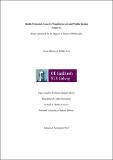| dc.contributor.advisor | Barry, Margaret M. | |
| dc.contributor.author | Mahmood, Samir | |
| dc.date.accessioned | 2015-07-01T10:05:47Z | |
| dc.date.issued | 2015-04-28 | |
| dc.identifier.uri | http://hdl.handle.net/10379/5053 | |
| dc.description.abstract | The present study is concerned with mapping health promotion capacity in LMIC contexts and seeks to develop a capacity mapping conceptual model and data collection process that will address these factors. The overall aim of the study is to develop and test a flexible and sensitive conceptual framework and data collection process to map health promotion capacity with specific reference to LMIC contexts.
A phased, multi-method approach was employed to develop and test a capacity mapping framework and assessment process in an LMIC context. A comprehensive review of the international literature on conceptual frameworks and methodologies for health promotion capacity mapping helped to identify a conceptual model and a set of core capacity domains appropriate for use in an LMIC context. To determine the suitability of the capacity mapping framework in an LMIC context, a layered online consensus building process was undertaken in Phase I of the study involving experts in global health promotion with experience of working in LMICs. The first round of the Delphi consultation examined the appropriateness of the conceptual framework and core capacity domains and was completed by 104 global experts from 53 countries. Based on the agreed capacity domains from Round 1, 65 of the original respondents went on to complete Round 2 of the Delphi, which explored their views on the capacity mapping survey tool.
In Phase II, a case study method was employed to test the revised capacity mapping framework and assessment process in a selected LMIC, Thailand. The mapping assessment process comprised the following data collection methods; a desk review of key policy and related documents, an online questionnaire and semi-structured telephone interviews conducted with 28 health promotion leaders and key informants at the country level, and a face-to-face discussion group with 9 senior level policymakers, academics and practitioners.
The consultation process resulted in development of a conceptual framework comprised of four core domains; country-specific context, governance, policy environment, and infrastructure; and 10 sub-domains. In Phase II of the study, the mapping framework and the assessment process were tested in Thailand. The findings highlighted the country¿s unique features in terms of Thai context including the cultural characteristics, bottom-up approach through community health promotion development and political buy-in. The presence of Thai Health Promotion Foundation has given the country high rating in health promotion developments within LMICs. Practical and methodological challenges highlighted in the study included the need for the mapping process to take a participatory approach that will engage a wide range of key stakeholders and that will result in reliable and valid information. The study findings highlight the complexity of assessing country level capacity in an LMIC context and calls for further testing of the capacity mapping framework and data collection process in other LMIC settings. Capacity mapping is an important process in supporting health promotion capacity development and its effective use is dependent on the availability of assessment methods that are meaningful, valid and sensitive to country specific contexts. | en_US |
| dc.rights | Attribution-NonCommercial-NoDerivs 3.0 Ireland | |
| dc.rights.uri | https://creativecommons.org/licenses/by-nc-nd/3.0/ie/ | |
| dc.subject | Health promotion | en_US |
| dc.subject | Capacity | en_US |
| dc.subject | Low and middle income countries | en_US |
| dc.title | Health promotion capacity mapping in low and middle income countries | en_US |
| dc.type | Thesis | en_US |
| dc.contributor.funder | National University of Ireland, Galway | en_US |
| dc.local.note | The study is concerned with mapping health promotion capacity in low and middle-income countries' (LMIC) contexts and seeks to develop a capacity mapping conceptual model and data collection process that will address these factors. The overall aim of the study is to develop and test a flexible and sensitive conceptual framework and data collection process to map health promotion capacity with specific reference to LMIC contexts. | en_US |
| dc.description.embargo | 2019-04-28 | |
| dc.local.final | Yes | en_US |
| nui.item.downloads | 301 | |


